THEN AND NOW: How the Miss Universe pageant has evolved over the last 69 years
Megan Willett-Wei,Gabbi Shaw

- Miss Universe is one of the "Big Four" pageants, with Miss World, Miss Earth, and Miss International.
- Miss Universe 2020 will be held on May 16 after a prolonged absence since December 2019.
- Insider took a look at the pageant's 69-year history to see how it has changed over the years.
Miss Universe started in 1952 as a marketing stunt by a California clothing company, Pacific Knitting Mills, after the winner of rival pageant Miss America refused to wear one of its swimsuits.
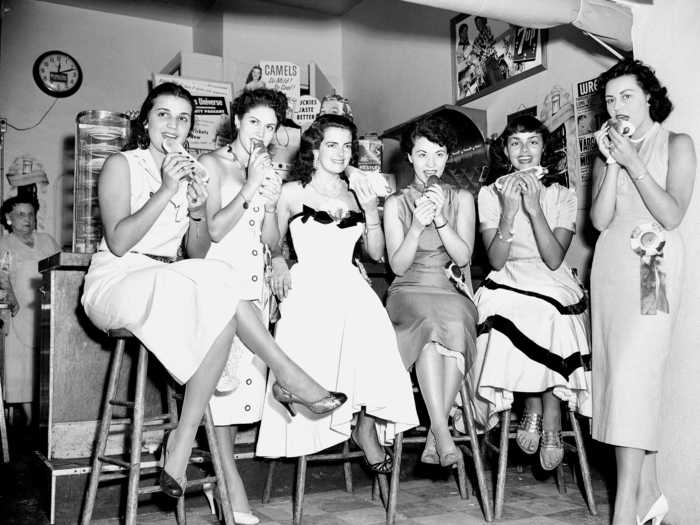
Miss America 1951, Yolanda Betbeze refused to pose in a bathing suit for Catalina Swimwear, so the company decided to make its own pageant, Miss Universe.
Only 30 contestants competed for the crown, and the first winner was Armi Kuusela of Finland.
Any country can compete in Miss Universe — all they need to do is pay a fee to the organization for franchise rights. However, this is partially why some smaller countries do not participate. They simply cannot afford it.
At first, the pageant was combined with the Miss USA pageant. It wasn't broadcast until 1955.
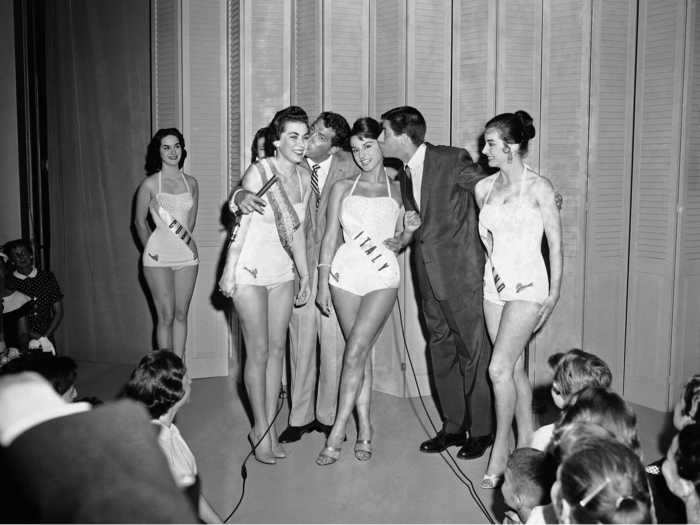
John Daly was the pageant's first host. He continued hosting until 1966, when he was replaced by Bob Barker.
In those early years, Miss USA was essentially a preliminary phase in the Miss Universe contest.
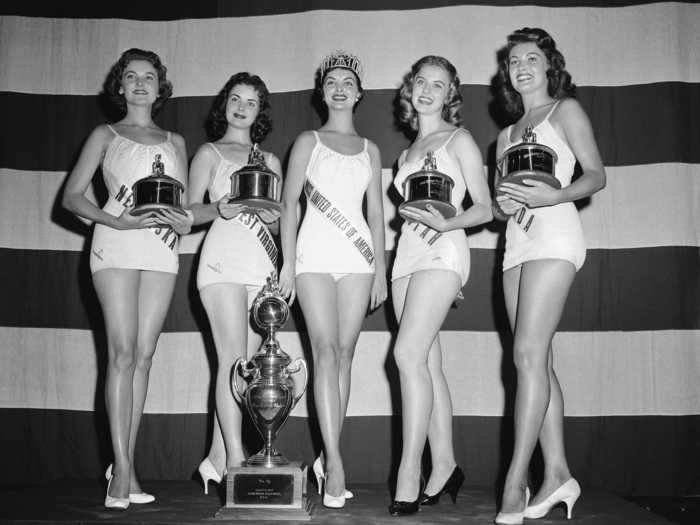
Miss USA is still the representative of America at Miss Universe, but the two pageants have become more separate entities.
There are similarities between Miss Universe, Miss USA, and Miss America though. At first, all required their contestants to be single, never have been married, and never have given birth to a child or parent a child.
In 1959, Japan's Akiko Kojima became the first Asian woman to be crowned Miss Universe.
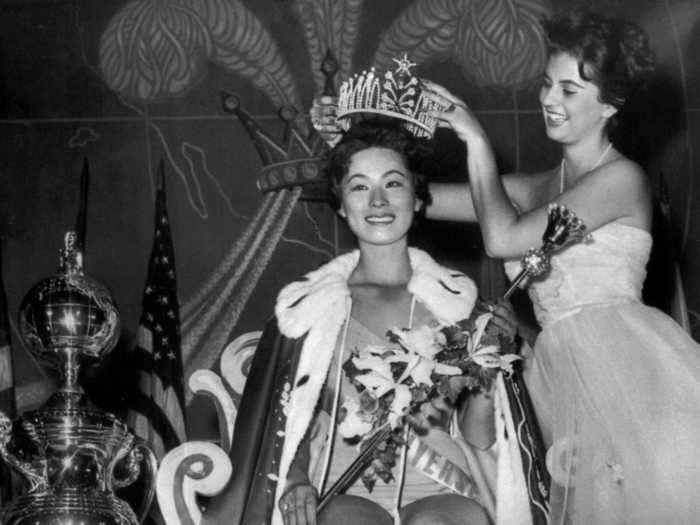
She was on the shorter side of winners at 5-foot-6.
In 1960, an interview portion was introduced to the contest. Here's a snapshot from that year, where the women wore their national costumes. It became a pageant staple.
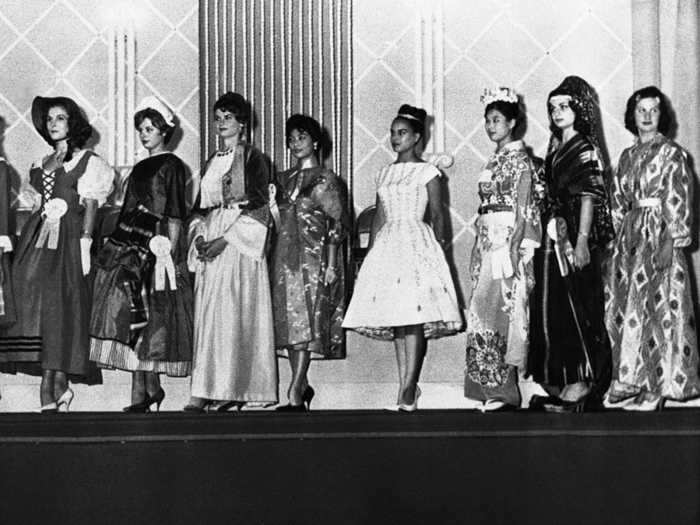
The National Costume portion of the competition has become a viewer-favorite.
From the '70s through the '90s, the pageant was over a month long, including rehearsals and preliminary contests.
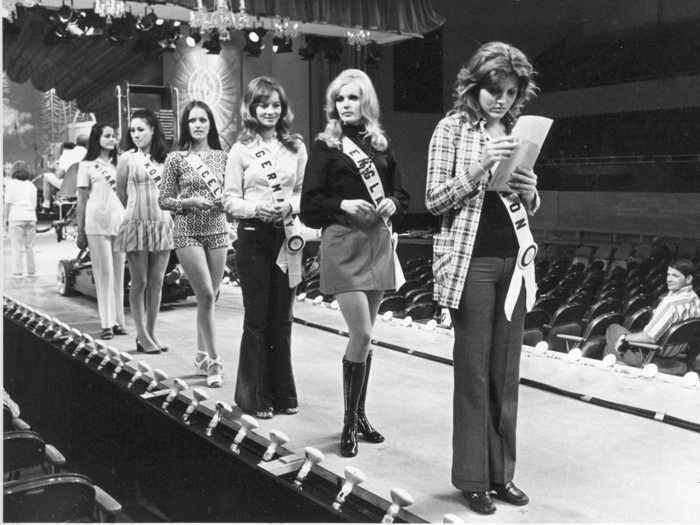
They've since streamlined the contest down to a week.
The '60s and '70s really cemented what the pageant would look like in the future. Here, Bob Barker announces that Rina Messinger of Israel had won the title in 1976.
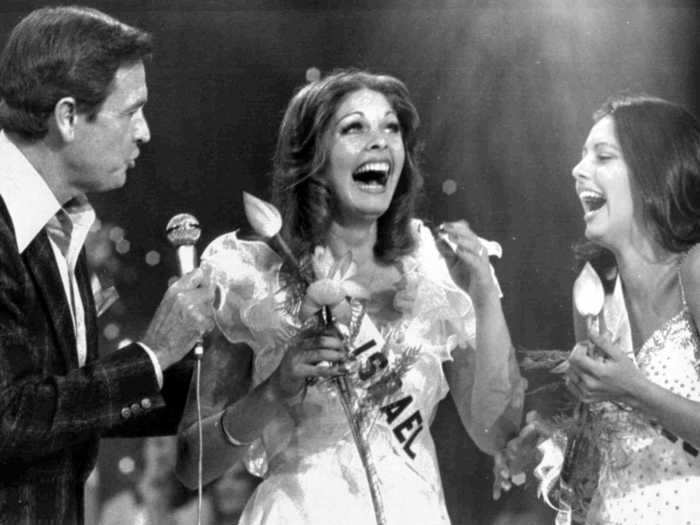
Barker was the host of Miss Universe from 1966 until 1987 — he resigned after the pageant refused to stop giving fur coats as prizes.
The finalists would always stand together while the runners-up were announced.
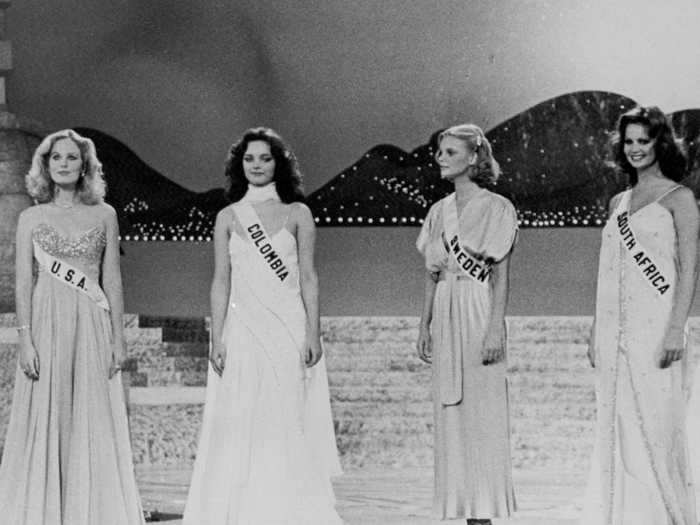
Now, as the contestants learn the results, they exit the stage leaving the final two alone.
Even if the body types were becoming increasingly similar, the winners were becoming more diverse. The first Black Miss Universe was Miss Trinidad-Tobago Janelle Commissiong in 1977.

Even though Commissiong won the Miss Photogenic award, it was still a surprise when she won the entire pageant.
The 1980s ushered in a new time of fit, gym-sculpted bodies. Miss USA, Shawn Weatherly, won in 1980.
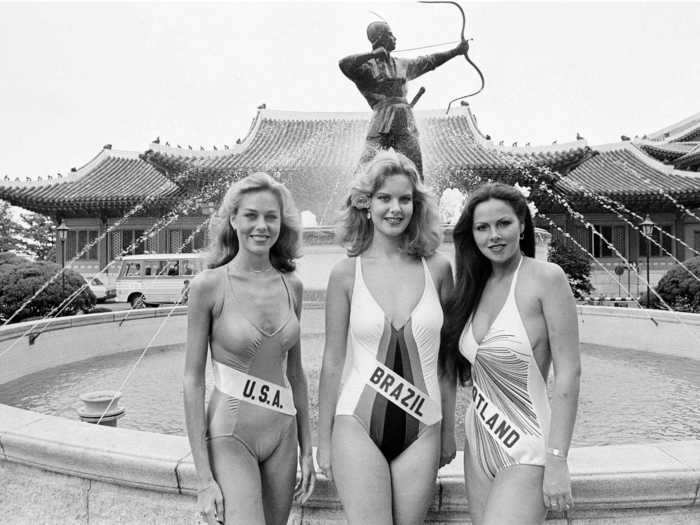
Weatherly went on to appear in "Baywatch" for a season.
The swimsuit competition has remained a staple in the pageant. Here are the 1996 contestants in a pre-show competition (reminiscent of "Baywatch," perhaps?).
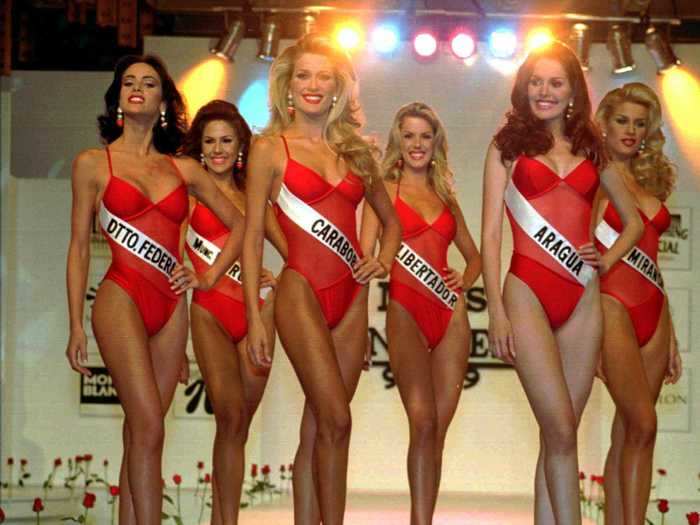
The 1996 pageant was the first one to be held under future US President Donald Trump's leadership.
Miss Venezuela, Alicia Machado, was crowned 1996 Miss Universe. She's since said she had a contentious relationship with then-pageant owner, future-POTUS Donald Trump.
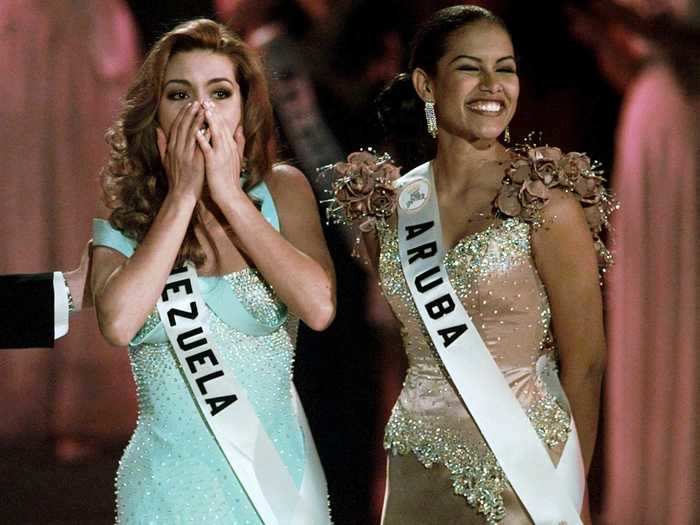
Trump's alleged treatment of Machado would come back to haunt him during his 2016 presidential campaign. His opponent, Hillary Clinton, reminded the world of how he, according to Machado, humiliated her by forcing her to exercise in front of a group of reporters after she gained weight during her reign.
Clinton and Machado alleged that Trump called her "Miss Piggy" and "Miss Housekeeping" as a reference to her Latin heritage.
Following the accusations, Trump told Fox News he "saved her job."
"I mean, look, I hardly know this person. This was a person 20 years ago," he said.
The stage and performances have gotten bigger and more elaborate over the years.

Unlike Miss America, Miss Universe does not have a talent portion.
In 2015, Trump was forced to sell the organization after comments made during his presidential campaign caused a controversy.
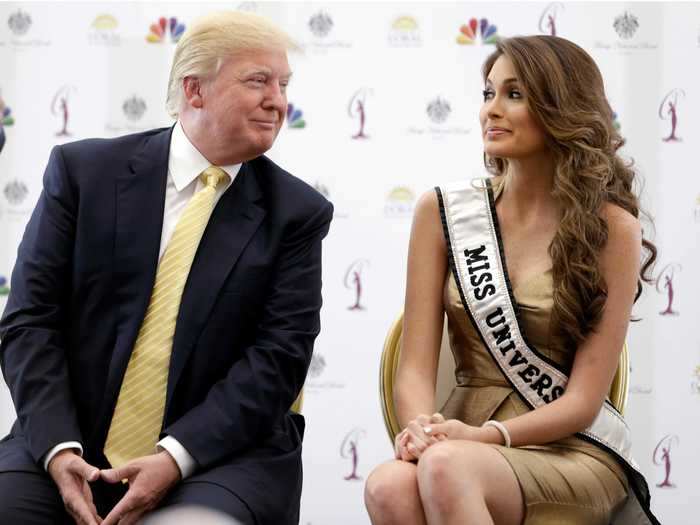
Trump bought every share of the pageant after NBC reportedly severed ties with him due to his controversial remarks about Mexican immigrants. He was then forced to sell the pageant. Talent agency WME/IMG is now its owner.
According to the pageant, winners must have intelligence and poise to handle the demands of their title. But a former judge told Forbes in 2011 that the winner is decided predominantly on her looks.
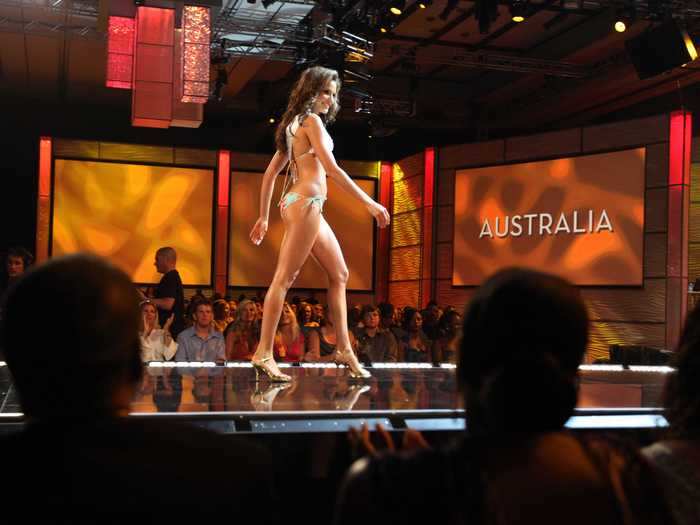
"Beauty, beauty, beauty. It's all about beauty. But read their bios. Every single one of them is smart, too," the former judge told Forbes.
Miss Universe 2015 caused a stir when host Steve Harvey accidentally announced Miss Colombia, Ariadna Gutierrez, as the winner instead of Miss Philippines, Pia Wurtzbach.
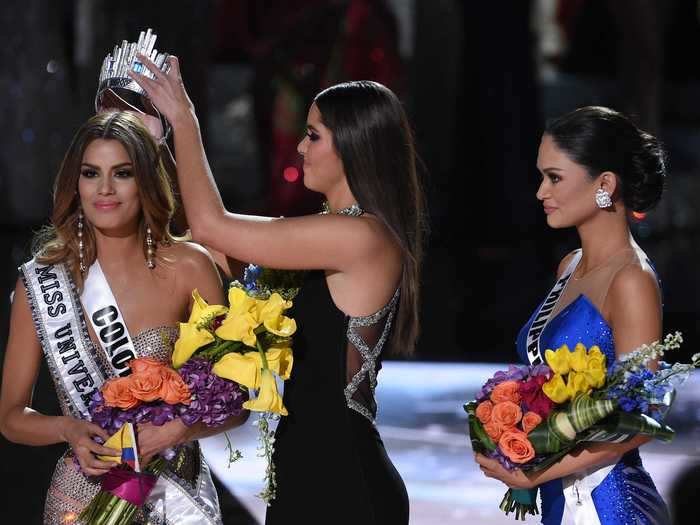
Harvey misread the cue card announcing the winner and runner-up, but others were convinced that it wasn't his fault. A theory posited that the teleprompter had the wrong names, and that's what confused Harvey.
The first transgender contestant in Miss Universe history made her debut in 2018. Angela Ponce, Miss Spain, was favored to win the entire competition.
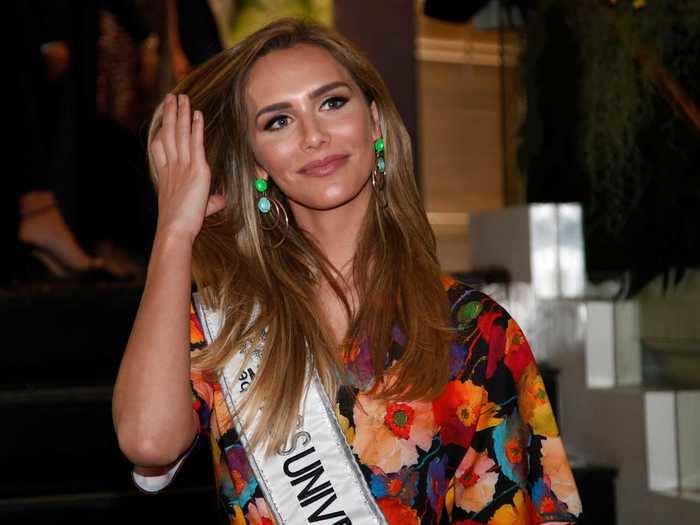
Miss Universe announced that it would allow transgender contestants in 2012 after a lawsuit, but it wasn't until 2018 that it saw its first contestant.
The Blast reported that Ponce was the clear favorite, with online bookies taking bets on her chances.
Ponce failed to make it to the top 20, and Catriona Gray of the Philippines went on to win Miss Universe 2018.
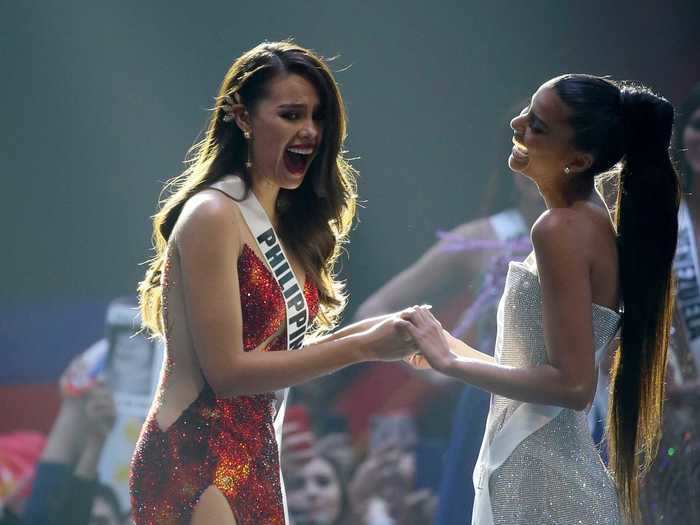
While Ponce was honored throughout the competition for her courage and historical impact, she was eventually eliminated and did not advance to the top 20.
Catriona Gray was only 22 years old when she won Miss Universe 2018. Her beauty and charisma always stands out, but Gray is also known for doing significant charity work for her home country of the Philippines. She has advocated for HIV-AIDS awareness and three years before the pageant, when she was only 19 years old, she was working to give a voice to children in the slums of Tondo.
Miss Universe 2019 had the first openly lesbian contestant, Swe Zin Htet of Myanmar, and the first Black winner since 2011, Zozibini Tunzi of South Africa.
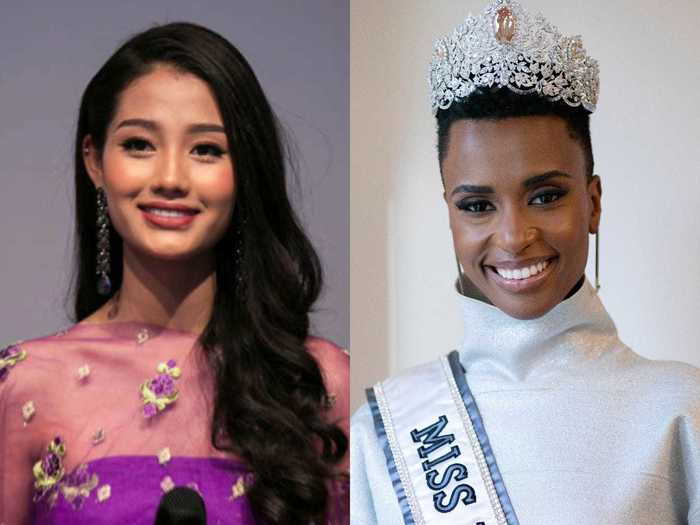
Htet came out in 2019, just a few days before she began competing in the pageant, making her the first openly lesbian contestant in Miss Universe history.
"I have that platform that, if I say that I'm a lesbian, it will have a big impact on the LGBTQ community back in Burma," Htet told People.
When Tunzi was crowned, she became the first Black Miss Universe in almost a decade, since Leila Lopes of Angola in 2011.
"I grew up in a world where a woman who looks like me, with my kind of skin and my kind of hair, was never considered to be beautiful," Tunzi said upon getting crowned, according to the BBC. "I think that it is time that that stops today," she added.
Miss Universe 2020 will air on Sunday, May 16, from Hollywood, Florida.
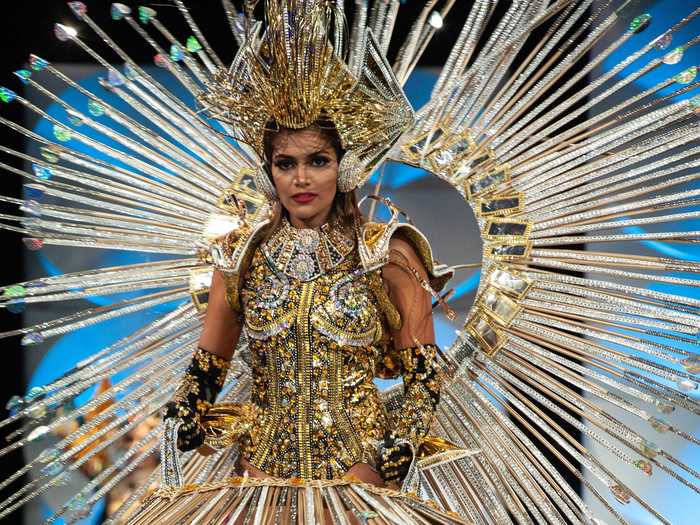
The 2019 winner, Zozibini Tunzi of South Africa, was crowned in December 2019. The 2020 pageant was postponed due to COVID-19.
The 2020 Miss Universe competition will be held in Hollywood, Florida. Competitors from 74 different countries will be participating, and the evening will be hosted by Mario Lopez and former Miss Universe Olivia Culpo.
READ MORE ARTICLES ON
Popular Right Now
Popular Keywords
Advertisement